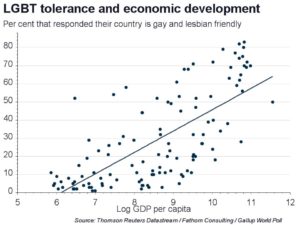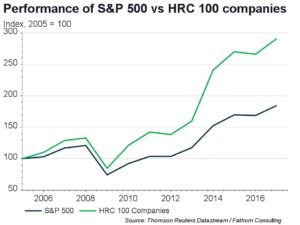A sideways look at economics
Last Saturday saw 2017’s Pride in London parade, uniting over a million people to celebrate the LGBT+ (lesbian, gay, bisexual, transgender and others) community and make a stand against discrimination. This year marks the fiftieth anniversary since the partial decriminalisation of homosexuality in the UK and the third since same-sex marriage was legalised. But other places around the world haven’t made as much progress. The results of a recent Gallup poll show that in only 25% of nations did a majority of respondents think their country was friendly to homosexuals.
Equal treatment is not just an issue of human rights; there are economic factors at work, too. As the chart below shows, measures of inclusion are correlated with GDP per capita, a common measure of economic development. Positive attitudes towards gay and lesbian people are also associated with a wide range of other indicators of economic and social progress, including levels of entrepreneurship, overall well-being and satisfaction, and human development.
Although countries with higher levels of GDP per capita tend to be more inclusive, it is not clear in which direction the causality flows. It is likely that as countries become richer and their populations become less concerned with basic subsistence, they have more regard for minority rights. In that sense, some might argue tolerance is a luxury – it rises more than proportionally as income rises. But it is not a luxury in a wider sense; it is welfare-increasing irrespective of whether it leads to higher GDP.
There is good reason to believe that economic development leads to increased LGBT+ tolerance. But it is quite likely that causality flows the other way, too: more tolerance leads to better economic outcomes. LGBT+ inclusion should increase the likelihood that all of a country’s residents reach their full potential and therefore raise productivity. It could also act as a signalling mechanism for an open, diverse and creative environment and encourage foreign investment. If this is true, inclusive policies may actually boost a country’s economic output and could warrant inclusion as part of a broader development strategy.
But raising levels of inclusion is not just an issue facing developing economies. Many leading global corporations have a high level of commitment to creating a culture of tolerance. Indeed, 14 of the 20 largest companies in the US score 100% in the Human Rights Campaign’s Corporate Equality Index, which rates workplaces based on their treatment of LGBT+ employees, consumers and investors. It is not currently a metric closely tracked by equity analysts – but perhaps it should be: LGBT+ inclusion is strongly linked to stock market performance. As the chart below shows, the share prices of companies who score 100% on the Corporate Equality Index have outperformed the S&P 500 by more than 40% over the past ten years.

